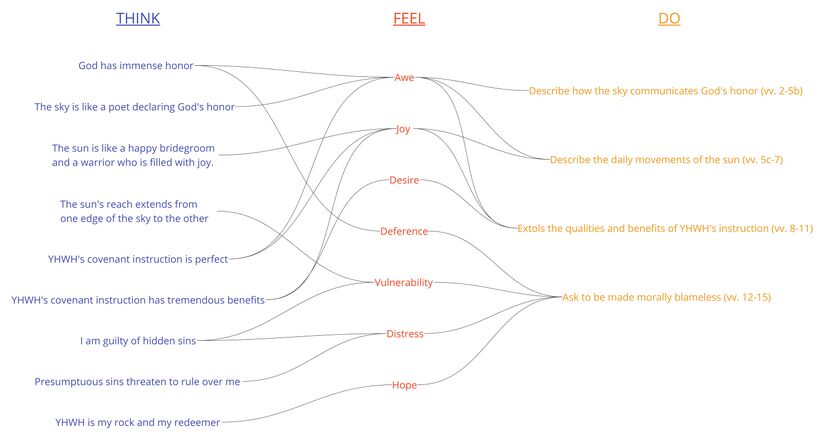Psalm 19 Emotional
Emotional Analysis
Emotional Analysis Chart
| Verse | Text (Hebrew) | Text (CBC) The Close-but-clear translation (CBC) exists to provide a window into the Hebrew text according to how we understand its syntax and word-to-phrase-level semantics. It is not intended to be used as a stand-alone translation or base text, but as a supplement to Layer-by-Layer materials to help users make full use of these resources. | The Psalmist Feels | Emotional Analysis Notes |
|---|---|---|---|---|
| 1 | לַמְנַצֵּ֗חַ מִזְמ֥וֹר לְדָוִֽד | For the director. A psalm. By David. | ||
| 2a | הַשָּׁמַ֗יִם מְֽסַפְּרִ֥ים כְּבֽוֹד־אֵ֑ל | The sky is declaring God’s honor, | Awe at the honor of the transcendent God revealed in the vast beauty of the sky | • The sky is "associated with what is high and remote" (SDBH). • The vast beauty of the sky inspires awe (cf. Ps 8). • The term אֵל (rather than יהוה) is typically used in passages where God's universal power and transcendence are highlighted (cf. Cassuto 1941, lectures 2-3). • "To encounter the glory of God is always awe-inspiring and numinous" DBI 330). • The revelation of God's glory can inspire terror and a sense of imminent demise (cf. Isa 6:1-5; Exod 19:16). |
| 2b | וּֽמַעֲשֵׂ֥ה יָ֝דָ֗יו מַגִּ֥יד הָרָקִֽיעַ׃ | and the firmament is telling about the workmanship of his hands. | ||
| 3a | י֣וֹם לְ֭יוֹם יַבִּ֣יעַֽ אֹ֑מֶר | Day after day pours out speech, | ||
| 3b | וְלַ֥יְלָה לְּ֝לַ֗יְלָה יְחַוֶּה־דָּֽעַת׃ | and night after night imparts knowledge. | ||
| 4a | אֵֽין־אֹ֭מֶר וְאֵ֣ין דְּבָרִ֑ים | There is no speech, and there are no words | ||
| 4b | בְּ֝לִ֗י נִשְׁמָ֥ע קוֹלָֽם׃ | whose sound is not being heard. | ||
| 5a | בְּכָל־הָאָ֨רֶץ ׀ יָ֘צָ֤א קַוָּ֗ם | Its verse line has gone forth throughout the whole earth, | ||
| 5b | וּבִקְצֵ֣ה תֵ֭בֵל מִלֵּיהֶ֑ם | and its words [have gone forth] throughout the edge of the world. | ||
| 5c | לַ֝שֶּׁ֗מֶשׁ שָֽׂם־אֹ֥הֶל בָּהֶֽם׃ | He has set up in it a home for the sun, | Awe, a taste of the sun's joy, and vulnerable to the sun's inescapable heat | • Several terms in this section are associated with joy (bridegroom, warrior, and the verb יָשִׂישׂ); it seems natural that these happy thoughts would inspire some measure of joy in the psalmist himself. • This sense of joy, however, is mixed with a sense of fearful vulnerability to the sun's inescapable heat. For the mixture of joyful awe and fear, see e.g., Ps 2:11 (discussed here). |
| 6a | וְה֗וּא כְּ֭חָתָן יֹצֵ֣א מֵחֻפָּת֑וֹ | and he is like a bridegroom coming out of his tent. | ||
| 6b | יָשִׂ֥ישׂ כְּ֝גִבּ֗וֹר לָר֥וּץ אֹֽרַח׃ | He is glad, like a warrior, to run his course. | ||
| 7a | מִקְצֵ֤ה הַשָּׁמַ֨יִם ׀ מֽוֹצָא֗וֹ | His starting point is from the edge of the sky, | ||
| 7b | וּתְקוּפָת֥וֹ עַל־קְצוֹתָ֑ם | and his turning point is at its edges, | ||
| 7c | וְאֵ֥ין נִ֝סְתָּ֗ר מֵֽחַמָּתוֹ׃ | and nothing is hidden from his heat. | ||
| 8a | תּ֘וֹרַ֤ת יְהוָ֣ה תְּ֭מִימָה מְשִׁ֣יבַת נָ֑פֶשׁ | YHWH’s instruction is perfect, restoring life. | Joy at the thought of how wonderful and beneficial YHWH's instruction is Desire to keep YHWH's instruction and so experience its benefits |
• Restoration often involves a feeling of contentment (cf. SDBH on שוב נפש). • Light to the eyes is "associated with well-being" (SDBH). • The psalmist uses the emotional term שמח, which refers to a "causative action where human or deities cause (other) humans to feel and show great joy" (SDBH). • The psalmist also uses the emotional term "desirable", which refers to a "state in which events have such a high quality ► that they provoke in others the desire to be involved in them" (SDBH). |
| 8b | עֵד֥וּת יְהוָ֥ה נֶ֝אֱמָנָ֗ה מַחְכִּ֥ימַת פֶּֽתִי׃ | YHWH’s testimony is reliable, making simpletons wise. | ||
| 9a | פִּקּ֘וּדֵ֤י יְהוָ֣ה יְ֭שָׁרִים מְשַׂמְּחֵי־לֵ֑ב | YHWH’s commandments are just, causing the heart to rejoice. | ||
| 9b | מִצְוַ֥ת יְהוָ֥ה בָּ֝רָ֗ה מְאִירַ֥ת עֵינָֽיִם׃ | YHWH’s command is flawless, giving light to the eyes. | ||
| 10a | יִרְאַ֤ת יְהוָ֨ה ׀ טְהוֹרָה֮ עוֹמֶ֪דֶת לָ֫עַ֥ד | Fearing YHWH is pure, enduring forever. | ||
| 10b | מִֽשְׁפְּטֵי־יְהוָ֥ה אֱמֶ֑ת צָֽדְק֥וּ יַחְדָּֽו׃ | YHWH’s rules are true; they are altogether right; | ||
| 11a | הַֽנֶּחֱמָדִ֗ים מִ֭זָּהָב וּמִפַּ֣ז רָ֑ב | those which are more desirable than gold, even much pure gold, | ||
| 11b | וּמְתוּקִ֥ים מִ֝דְּבַ֗שׁ וְנֹ֣פֶת צוּפִֽים׃ | and sweeter than honey, even virgin honey from the honeycomb. | ||
| 12a | גַּֽם־עַ֭בְדְּךָ נִזְהָ֣ר בָּהֶ֑ם | Furthermore, your servant is warned by them. | Deference, expressed by referring to himself as your servant Fearful and warned about his current state (i.e., he is guilty of mistakes and hidden sins and threatened by the rule of presumptuous sins). Hopeless in the face of his inability to discern mistakes and in the face of the power of presumptuous sin. Hope in YHWH as his rock and redeemer |
• In this section, "The style shifts; the words of hope and need are disjunctive and anxious, as contrasted with the hymnic, parallel strophes of part 1 [vv. 2-7] and the explicatory didacticisms of part 2 [vv. 8-11]. They express hesitant, anxious emotions. They burst from the soul and shatter the stately elegance of the language of the psalm's opening lines. The lines of part 3, by contrast, reveal the psalmist in his radical subjectivity, with his own torment and anxiety" (Fishbane 1998, 89). • The same mixture of joy, awe, and fear which was hinted at above in the description of the sun (vv. 5c-7) also characterizes the psalmist's relationship to YHWH's covenant instruction. One the one hand, YHWH's instruction fills him with joy. On the other hand, the perfection of YHWH's words (in contrast to his own imperfection) leads him to feel "warned" (="process by which someone becomes aware of something (usually bad) that is going to happen", SDBH). • The phrase "your servant" is a polite form of self-deference (cf. HALOT). • The emotions of the psalmist are similar to the emotions of Isaiah in Isa 6. When Isaiah saw the glory of God in his temple, he responded by saying, "Woe is me, for I am ruined! For I am a man of unclean lips." Similarly, when the psalmist 'hears' the glory of God in the sky and contemplates the perfection of YHWH's word, he realizes his own guilt and uncleanness, specifically with regard to his speech (cf. v. 15), and he prays for forgiveness and protection. |
| 12b | בְּ֝שָׁמְרָ֗ם עֵ֣קֶב רָֽב׃ | There is great reward in keeping them. | ||
| 13a | שְׁגִיא֥וֹת מִֽי־יָבִ֑ין | Who can discern mistakes? | ||
| 13b | מִֽנִּסְתָּר֥וֹת נַקֵּֽנִי׃ | Clear me from the guilt of hidden sins! | ||
| 14a | גַּ֤ם מִזֵּדִ֨ים ׀ חֲשֹׂ֬ךְ עַבְדֶּ֗ךָ | Also, prevent your servant from committing presumptuous sins! | ||
| 14b | אַֽל־יִמְשְׁלוּ־בִ֣י | Do not let them rule over me! | ||
| אָ֣ז אֵיתָ֑ם | Then I will be blameless | |||
| 14c | וְ֝נִקֵּ֗יתִי מִפֶּ֥שַֽׁע רָֽב׃ | and innocent of great crime. | ||
| 15a | יִֽהְי֥וּ לְרָצ֨וֹן ׀ אִמְרֵי־פִ֡י | Let the words of my mouth and the meditation of my heart | ||
| 15b | וְהֶגְי֣וֹן לִבִּ֣י לְפָנֶ֑יךָ | be acceptable before you, | ||
| 15c | יְ֝הוָ֗ה צוּרִ֥י וְגֹאֲלִֽי׃ | YHWH, my rock and my redeemer! |
Notes
- The major emotional shift in the psalm comes in v. 12. As Fishbane writes, "The style shifts; the words of hope and need are disjunctive and anxious, as contrasted with the hymnic, parallel strophes of part 1 [vv. 2-7] and the explicatory didacticisms of part 2 [vv. 8-11]. They express hesitant, anxious emotions. They burst from the soul and shatter the stately elegance of the language of the psalm's opening lines. The lines of part 3, by contrast, reveal the psalmist in his radical subjectivity, with his own torment and anxiety" (Fishbane 1998, 89). In the end however, in the very last line, the psalm ends on a note of hope: "YHWH, my rock and my redeemer."



